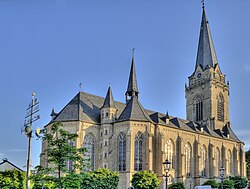Willich
Willich | |
|---|---|
 Church of Saint Catherine | |
 Coat of arms | |
show Location of Willich within Viersen district | |
 Willich | |
| Coordinates: 51°15′47″N 6°32′57″E / 51.26306°N 6.54917°ECoordinates: 51°15′47″N 6°32′57″E / 51.26306°N 6.54917°E | |
| Country | Germany |
| State | North Rhine-Westphalia |
| Admin. region | Düsseldorf |
| District | Viersen |
| Subdivisions | 4 |
| Government | |
| • Mayor (2020–25) | Christian Pakusch[1] (CDU) |
| Area | |
| • Total | 67.77 km2 (26.17 sq mi) |
| Elevation | 40 m (130 ft) |
| Population (2020-12-31)[2] | |
| • Total | 50,283 |
| • Density | 740/km2 (1,900/sq mi) |
| Time zone | UTC+01:00 (CET) |
| • Summer (DST) | UTC+02:00 (CEST) |
| Postal codes | 47877 |
| Dialling codes | 02154, 02156 |
| Vehicle registration | VIE |
| Website | www.stadt-willich.de |
Willich (['vɪllɪç]) is a town in the district of Viersen, in North Rhine-Westphalia, Germany. It is located near the cities of Düsseldorf, Mönchengladbach and Krefeld, about 30 kilometres from the border with the Netherlands.
History[]
The city was founded in 1970 out of the formerly independent villages of Willich, Anrath, Schiefbahn and Neersen, although the villages are much older. Anrath was mentioned for the first time in 1010, Willich in 1245, Neersen in 1262 and Schiefbahn in 1420.
The villages belonged to the Electorate of Cologne until the French Revolutionary Wars when they were occupied and annexed by France in 1794. At the end of the Napoleonic Wars in 1815 the villages fell to the Kingdom of Prussia.
1891–1945[]
In 1891 a tornado devastated Anrath. The village was already impoverished by the decline of previously dominant domestic weaving and now the municipal administration of Anrath even considered a dissolution of the village. To improve the economic situation a royal prison was built. It was completed in 1905.
In 1908 Stahlwerk Becker (a steel mill) was built and up to its closing in 1932 was one of the largest employers in Willich. Under a new owner, the mill was reopened in 1934 and was used to manufacture military supplies. The factory was finally closed in 1945 and the grounds were converted to a military base for the British Armed Forces.
During World War II, Willich suffered only minor damage to its infrastructure. During Operation Grenade on March 1, 1945 American forces which had entered Schiefbahn met a counterattack from a German Panzer unit. Heavy fighting erupted, with both sides suffering numerous casualties.[3]
During the 19th century more than 100 Jews lived in the four villages. During the Third Reich, the Nazis deported 40 Jews – of which 38 were ultimately murdered in the Nazi death camps.
British Army[]
The British Army had soldiers stationed in Willich for more than 40 years: 40 Army Engineer Support Regiment (40 AESR), which by the early 80s was reduced down to 40 Army Engineer Support Group (40 AESG). Both units belonged to the Royal Engineers. In 1992 the camp was closed and the group disbanded. In July 2009 a reunion took place in the old camp. 141 attended the evening event. There was a reunion again in 2012 with over 200 joining in the complete weekend.
Economy[]
Many international companies, especially from the Far East, have their European or German headquarters in the town.
Transportation[]
Streets[]
The Bundesautobahn 44 and Bundesautobahn 52 motorways join together within the municipal area of Willich. In the area there are five junctions.
Railways[]
A railway station is situated in Anrath.
Notable places[]
Schloss Neersen[]
The most famous building is "Schloss Neersen". The castle goes back to the 13th century and was heavily rebuilt in the 17th century. It now houses the town council offices. During summer an open-air theatre is held in the grounds.
Klein-Jerusalem chapel[]
A moderately well-known pilgrimage destination is the 17th century "Klein-Jerusalem" wayside chapel.
Anrath Prison[]
The former royal Prison in Anrath is now a federal state prison named "Justizvollzugsanstalt Willich".[4]
Twin towns – sister cities[]
References[]
- ^ Wahlergebnisse in NRW Kommunalwahlen 2020, Land Nordrhein-Westfalen, accessed 30 June 2021.
- ^ "Bevölkerung der Gemeinden Nordrhein-Westfalens am 31. Dezember 2020" (in German). Landesbetrieb Information und Technik NRW. Retrieved 21 June 2021.
- ^ Hügen, Ludwig (1974). Der Krieg geht zu Ende. Niederrheinische Berichte zur Operation Grenade 1945. Schriftenreihe des Kreises Kempen-Krefeld. (in German)
- ^ Official site (in German)
- ^ "Städtepartnerschaften". stadt-willich.de (in German). Willich. Retrieved 2021-02-17.
External links[]
- Official website
 (in German)
(in German)
- Towns in North Rhine-Westphalia
- Viersen (district)
- Holocaust locations in Germany



